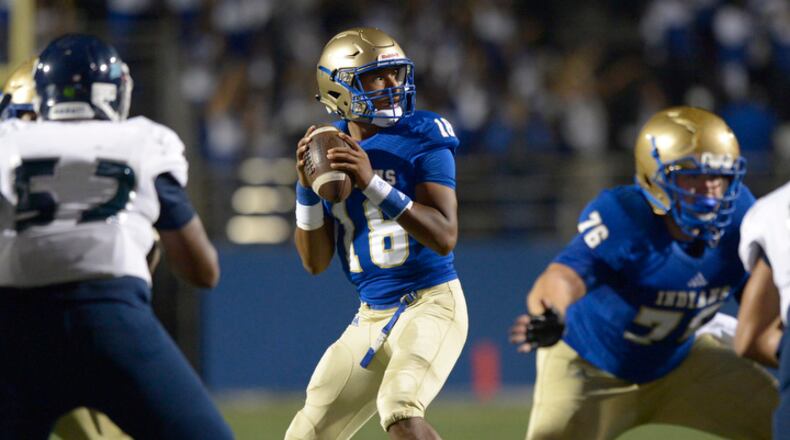Several high-profile athletic transfers in Georgia have grabbed state and national headlines this school year, but GHSA executive director Robin Hines said that the numbers have not increased from previous years, in spite of the coronavirus pandemic.
Hines said the GHSA averages about 5,800 athletes transferring for athletic purposes each school year and that 2,422 athletes have transferred this school year, with winter and spring sports approaching. He noted that transfers spiked to approximately 10,000 during the 2017-18 school.
“I think things are about the same as they always were,” Hines said. “Everything seems to be tracking about the same.”
There currently are 395,770 athletes competing in GHSA-sanctioned sports.
That hasn’t stopped the attention. Chief Borders, a 4-star linebacker who committed to Florida, transferred from McEachern to Carrollton, was ruled ineligible, then transferred from Carrollton to Heard County and was ruled eligible.
“We didn’t think he’d even have an opportunity to play this season,” Heard County coach Tim Barron said. “As the (transfer) process continued, the parents were informed that if a bona-fide move was made, he’d be granted eligibility.”
The Borders case seemed to create a blueprint for transfers who initially were ruled ineligible, and other players followed suit. Carlos Del Rio, a 4-star quarterback committed to Florida, was ruled ineligible after transferring from to Grayson from McEachern, then transferred from Grayson to Cartersville and is starting for the Purple Hurricanes.
Then there’s the case of 4-star quarterback and USC commitment Jake Garcia, which made national headlines when his father, Randy Garcia, told ESPN’s Mark Schlabach in a story published Sept. 16 that he dissolved his marriage to separate the family in an attempt to validate his son’s transfer to play at Valdosta.
Garcia initially was ruled eligible to play at Valdosta, then Class 6A’s top-ranked team, and started Sept. 4 for the Wildcats in their season-opening victory against Warner Robins, the No. 1 team from 5A. When the GHSA learned of Randy Garcia’s comments, the organization reversed its decision and ruled him ineligible. As a result, Valdosta had to forfeit the Warner Robins game — the only game Garcia played for the Wildcats.
If the GHSA rules a player ineligible, the player can’t compete at that school for one calendar year. However, the player can transfer again to another school, go through application process again, and if all information and supporting documents provided demonstrate a bona fide move, then the player is ruled eligible.
GHSA bylaws define a bona-fide move as a move in which the “entire parental unit or persons he/she resided with at the former school, and the student and parent(s) or persons residing with the student” move to “live in the service area of the new school.”
Hines declined to comment on specific cases, but spoke about the parental-unit factor in general terms.
“If the parents divorce or have a legal separation, there needs to be a final order from the court at the time of enrollment,” Hines said. “It can’t come afterwards. You can’t claim a bona-fide move and then say, ‘Oh, by the way, we’re getting a divorce’ and produce a document later. That’s misrepresenting the move.”
Garcia transferred from Valdosta to Grayson and was ruled eligible Monday to play for the Rams, ranked No. 2 in 7A and nationally in the five major polls.
Valdosta coach Rush Propst said he believes special pandemic concessions should be made for high-profile recruits transferring from states that canceled fall football. That’s what happened to Garcia, who was playing in California.
Garcia plans to enroll early at USC, so California’s tentative plans for a spring football season are irrelevant to players like him.
“You’ve got these college football coaches, who I think are the real culprits, telling these kids to go play because they need to evaluate them,” said Propst, who has 297 career victories. “The high-profile kids are going to be on college campuses in the spring because they graduated early, so a lot of them are making the decision (to move) based on getting reps. They can’t sit out a year and expect to walk onto campus in the spring and be ready to go.”
Or, even worse, Propst notes, is if seniors with scholarships who’ll play at the next level play a football season this spring, graduate, enroll at college and then almost immediately begin summer practice for what will be their second football season in a calendar year — without a break between.
“That’s more dangerous than the coronavirus,” Propst said.
Propst sees similarities in states canceling fall football and Hurricane Katrina making landfall in New Orleans in 2005, sending an influx of transfers from Louisiana into Alabama, where he was coaching at Hoover, outside Birmingham.
“I don’t see any difference in what happened with the natural disaster and the pandemic,” he said. “We had transplants in 2005 who were granted waivers that allowed them into Hoover, and we had 5-6 kids who were displaced. You’ve got these states shutting down, and I think (the GHSA) should be granting waivers.
"It’s hard to move (the parental unit) all at one time, in a matter of weeks. That’s not reality, and the rule needs to change. What’s wrong with a kid moving in April to get acclimated, then the rest of the family moves in the summer?”
Hines said that the GHSA must look at the empirical data of the transfer, not the reasons why an athlete transfers.
“It’s hard to put in a policy or bylaw based on feeling,” Hines said. “I’d rather take criticism and do it right than to make a decision based on feeling. Between the appeals process and hardships, I believe everything, including a pandemic, is accounted for already in the bylaws.”
About the Author
The Latest
Featured

